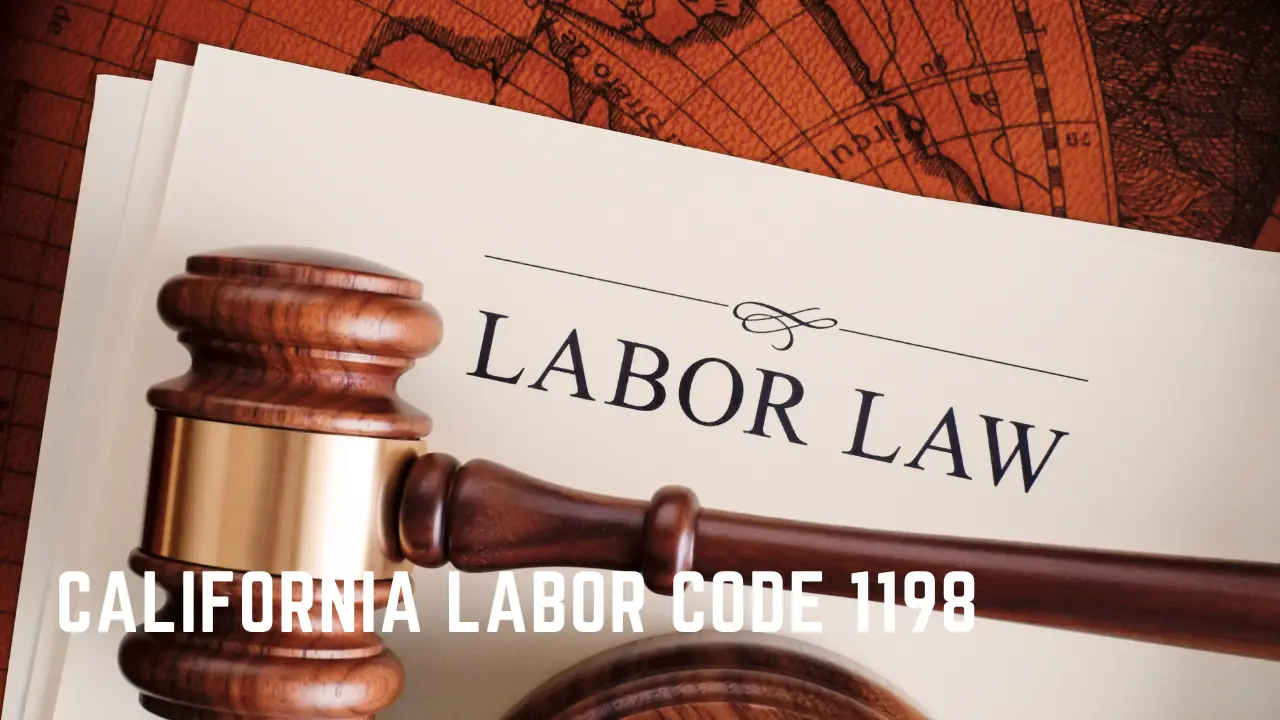As a cornerstone of California’s employment law, Labor Code 1198 sets forth the standards for work hours and labor conditions, a topic that holds significant implications for both employers and employees throughout the state. These guidelines, enforced by the Division of Labor Standards Enforcement (DLSE), carry stringent penalties for non-compliance, underscoring the importance of understanding and adhering to these provisions.
Within this complex legal landscape, several key components of the Labor Code, as well as influential court cases, further shape the interpretation and application of these laws. To fully grasp the gravity and extensive reach of Labor Code 1198, we must first unpack its fundamental elements and consider its practical impact on the day-to-day operations of businesses and the working conditions of employees.
Understanding Labor Code 1198
California’s Labor Code 1198 plays a pivotal role in defining the legal framework for maximum work hours and working conditions, ensuring that employers comply with these state-mandated regulations to promote a fair and safe work environment. This statute essentially prohibits employers from employing any worker under conditions that violate the state’s wage orders.
Any employer found in violation of Labor Code 1198 can face serious legal consequences, including criminal fines and potential imprisonment. Furthermore, the employee who suffers as a result of such violation has the right to bring forth a lawsuit against the employer.
Therefore, understanding Labor Code 1198 is crucial not only for employers to maintain compliance, but also for employees to ensure their rights are being protected.
Legal Regulations Overview
Building on the understanding of Labor Code 1198, a broader examination of legal regulations reveals a comprehensive framework designed to uphold just and safe labor conditions in California.
The Division of Labor Standards Enforcement (DLSE) enforces these regulations, with severe penalties for non-compliance, including misdemeanors, fines, and imprisonment. Crucial to this regulatory structure is the role of specific labor codes like § 1297, which restricts the work hours of certain categories of workers.
Legal precedents from cases such as Rhoades v. Progressive Cas. Ins. Co. and Hall v. Rite Aid Corp. further shape the interpretation and application of these laws. Entities like the Jonny Law provide essential legal aid services, supporting workers in challenging any violations of their labor rights.
Consequences of Non-compliance
Navigating the complex landscape of labor laws, employers who fail to adhere to the stipulations delineated in the Labor Code face serious repercussions ranging from misdemeanors to severe financial penalties.
The Division of Labor Standards Enforcement (DLSE) oversees the enforcement of these laws, and non-compliance can result in criminal fines or even imprisonment under Labor Code 1198. Furthermore, employers may face lawsuits from aggrieved employees, leading to additional financial burdens.
Labor Code 1199 further stipulates that violation of any order fixing hours or conditions of labor is a misdemeanor. Therefore, it is crucial for employers to diligently comply with all stipulations in the Labor Code to avoid these significant legal and financial consequences.
Labor Code References
To understand the legal framework surrounding work hours and labor conditions, it is imperative to delve into specific legislation such as California Labor Code 1198, 1199, 1297, and 1303.
Labor Code 1198 establishes the maximum hours and days a person may be employed, while Labor Code 1199 imposes penalties for employers who violate these provisions.
For minors, Labor Code 1297 outlines restrictions on work hours, specifically for 16- and 17-year-old messengers. Labor Code 1303 provides further protections for specific classes of workers.
Understanding these labor codes is essential as they form the basis of lawful employment practices in California. Violations can lead to legal consequences, including fines and imprisonment, highlighting the importance of compliance.
Influential Legal Precedents
While understanding the aforementioned Labor Codes is essential for lawful employment practices, it’s equally important to consider the role of influential legal precedents in shaping the interpretation and application of these laws.
- Brinker Restaurant Corp. v. Superior Court: This case clarified the employer’s obligation to provide meal and rest breaks. It emphasized that the employer must relinquish control over the employee’s activities, but need not ensure that the employee does no work.
- Murphy v. Kenneth Cole Productions, Inc.: This precedent determined that payments to employees for missed rest periods are considered wages, not penalties, affecting statute of limitations and potential claims.
- Martinez v. Combs: The ruling in this case expanded the definition of employer under California wage and hour laws, impacting liability considerations.
Jonny Law Services
Offering a plethora of legal aid services, the Jonny Law stands as a steadfast advocate for California workers grappling with challenges related to employment rights violations. Their team of seasoned attorneys navigates through the complexities of the California Labor Code, particularly section 1198, to ensure the protection and enforcement of labor rights.
They provide comprehensive services, from legal consultation to representation in court cases concerning working hours and labor conditions. The firm also helps clients understand their rights and obligations under the law, and it offers resources to inform them about recent developments and precedents.
With its client-centric approach, the Jonny Law is committed to empowering workers and ensuring fair labor practices in California.
Safeguarding Client Information
In the realm of legal aid services, the Jonny Law prioritizes the safeguarding of client information, adhering strictly to copyright and privacy policies to ensure the utmost confidentiality. Several measures have been established to protect sensitive client data:
- Secure Systems: The firm utilizes encryption and secure servers to store client information, protecting it from unauthorized access.
- Limited Access: Access to client information is restricted to authorized personnel only, ensuring that data is not mishandled or misused.
- Policy Adherence: The firm complies with state and federal laws on data privacy, including the California Consumer Privacy Act (CCPA).
These measures not only safeguard client information but also enhance the firm’s credibility, reinforcing the trust clients place in them.
Quick Legal Assistance
Building on the firm’s commitment to confidentiality, the Jonny Law also excels in providing rapid legal assistance to its clients. Understanding the value of time in legal matters, the firm ensures a prompt response, usually within five minutes of a query.
The quick legal assistance is not limited to just consultations; it extends to comprehensive legal services such as review and analysis of relevant documents, like pay stubs, and strategic planning for challenging employer rights violations.
In addition, the firm’s robust online presence permits multiple communication channels for clients, ensuring accessibility and ease. With its swift legal aid, the Jonny Law provides an invaluable resource for workers navigating the complex landscape of labor laws, particularly those related to work hours and conditions.
Social Media Connections
Leveraging the power of social media, the Jonny Law maintains an active online presence to foster seamless interaction with clients and provide real-time updates on labor laws and relevant legal matters. The firm’s strategic use of these platforms significantly enhances its client engagement, accessibility, and service delivery.
- Facebook: The firm provides clients with regular updates on labor law changes, relevant news, and legal tips. It also allows for direct messaging, further enhancing client communication.
- Twitter: This platform is used for timely sharing of labor law news and quick updates. It enables the firm to engage in real-time discussions on relevant topics.
- LinkedIn: This platform helps the firm to connect professionally with clients, share in-depth legal articles, and showcase its expertise in labor law.
Effective Communication Methods
To ensure efficient and effective client communication, the Jonny Law employs several methods, each tailored to meet the unique needs and preferences of their clientele. The firm utilizes modern digital platforms, traditional phone calls, and in-person meetings to offer accessible, personalized service.
They utilize a responsive online form for clients to submit inquiries swiftly. The firm also ensures prompt responses, with a commitment to reply within a five-minute window, ensuring client issues are addressed quickly.
Document submission is streamlined, allowing clients to upload necessary files like pay stubs for review. Lastly, communication is further enhanced through active social media channels, providing an additional avenue for client engagement and information dissemination.
These comprehensive methods ensure transparent, effective communication, crucial in legal matters.
Submitting Relevant Documents
In the pursuit of addressing labor violations, the submission of pertinent documents, such as pay stubs, plays a pivotal role in corroborating employee claims and substantiating legal arguments. These documents serve as concrete evidence of any discrepancies in compensation or breaches of the Labor Code 1198.
- Pay Stubs: They provide a detailed breakdown of wages and hours worked, which can highlight any discrepancies between the actual pay received and the amount required under Labor Code 1198.
- Work Schedules: These documents can shed light on any potential infractions relating to work hours and rest periods.
- Employment Contract: A thorough review of this document can expose any violations of agreed-upon terms, conditions, and the Labor Code 1198.
Summary of Labor Codes
Building upon the importance of these relevant documents in identifying labor violations, it is essential to understand the fundamental Labor Codes that establish the legal standards for work hours, conditions, and wages in the state of California.
For instance, Labor Code 1198 sets the maximum hours of work and regulates labor conditions, while Labor Code 1199 imposes penalties for violations. Labor Code 1297 further stipulates work hours for young workers. Violation of these codes can result in severe consequences, including criminal fines and potential imprisonment.
Interpretation of these laws is also shaped by legal precedents such as Rhoades v. Progressive Cas. Ins. Co. and Hall v. Rite Aid Corp. Thus, understanding these Labor Codes is crucial to ensuring labor rights and compliance.
Conclusion
In conclusion, California’s Labor Code 1198, along with related sections, play a pivotal role in regulating work hours and labor conditions.
These regulations, enforced stringently by the DLSE, carry significant penalties for non-compliance. Legal precedents further shape the application of these laws.
Professionals, like those at the Jonny Law , provide valuable assistance in navigating these complexities, ensuring adherence to these codes, and protecting workers’ rights.









